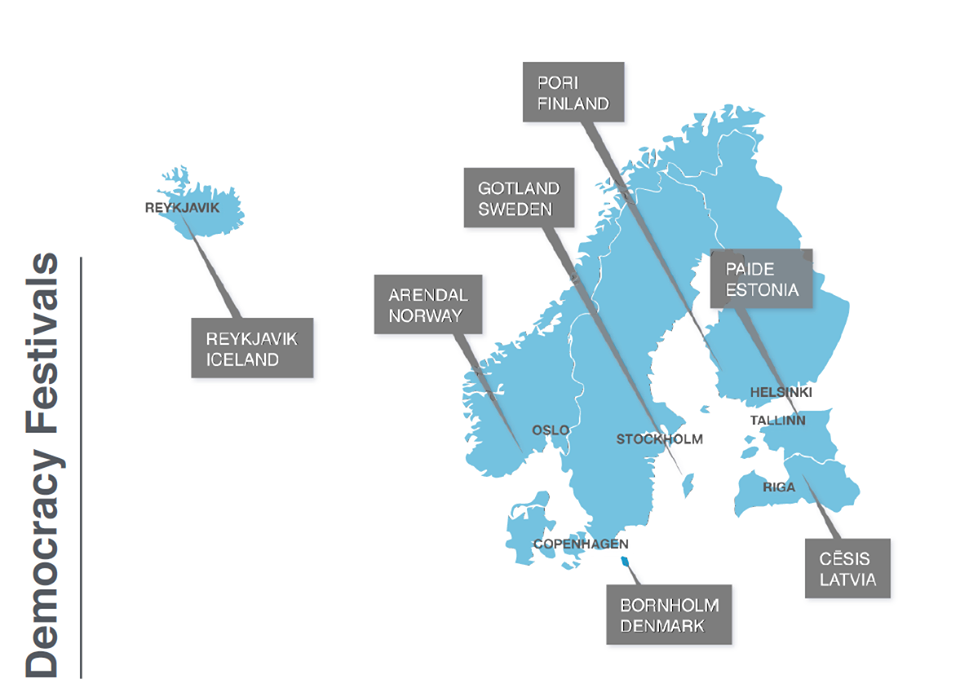The Opinion Festival, taking place in Estonia for the sixth year running, is now part of Democracy Festivals, a newly established network of like-minded events. Eight democracy festivals from the Nordic and Baltic regions, from Visby in Sweden to Birštonas in Lithuania, have joined forces in an effort to foster stronger participatory democracy everywhere in the world and offer opportunities to learn from each other’s experience and best practice.
The network was formed as the result of a joint Estonian-Latvian-Danish initiative. It was initially the brainchild of Ieva Morica who heads the conversation festival LAMPA, who had been supported by the Opinion Festival team for putting on the festival. Kristi Liiva, founder of the Opinion Festival, said: “We spoke about the various areas for improvement that can be found in every country’s democratic discussion process as well as communication culture more broadly, and that spurred us on to lean more heavily on each other’s best practice and together start breathing life into the wider mission of ‘democracy festivals’.”
The change agency We Do Democracy, headed by Zakia Elvang, is leading the platform and the project. “It’s fair to say democracy festivals have really gone viral in the Baltic sea region. They are all well known and respected in their countries, they have all become a must attend event for people from all corners of society who are interested in the country’s future. We believe this is open democracy in the making,” says Zakia Elvang.
The ambition of the Democracy Festivals platform
The unique participatory democracy and experience of democracy festivals in the Nordic and Baltic countries deserve wider recognition, and the aim of the Democracy Festivals web platform is to capture and share some of that experience. Here you can find an introduction to eight individual festivals whose aim is to advance democracy, as well as guidance for anyone who would like to kickstart their own festival or promote discursive democracy in some other way. In addition to the Opinion Festival, members of the network include Almedalsveckan (Sweden), SuomiAreena (Finland), LAMPA (Latvia), Fundur Fólksins (from 2018 known as Lysa; Iceland), Arendalsuka (Norway), Taani Folkemødet (Denmark) and Būtent! (Lithuania).
The ambition of the democracy festivals is supported by the Nordic Council of Ministers. Christer Haglund, Director of the director of the Council’s Office in Estonia, commented: “Today’s democracy is in constant flux, bringing with it challenges as well as new opportunities. We support cooperation between the Baltic and Nordic countries to improve the culture of public debate, inspiring people to take part in social discussion which in turn supports their sense of safety and welfare, their ability and courage to express themselves, and their willingness to listen to others and respect different opinions. We want to help this kind of culture of public debate take off beyond our region.”
The format of the democracy festivals has attracted interest from several countries, including Ukraine, South Korea, the United Kingdom, the Netherlands, Belgium, and Belarus, but also places like the Catalonia region.
Opinion Festival stands out for extensive volunteer support
The Opinion Festival in Paide is distinct from the other festivals primarily for two reasons. According to Maiu Lauring, head organiser of the Opinion Festival, “unlike the other festivals where the main organiser tends to be the local government and/or local enterprises, in our case the festival comes together as a combined effort of hundreds of volunteers and supporters. Our partner festivals have been amazed by our capacity to involve so many volunteers and especially the local community totogether keep the festival going. Nordic democracy festival organisers have also been impressed by just how well the festival grounds layout, the creation of space and ambience of the Opinion Festival supports discussions, both those organised beforehand as well as spontaneous ones. Within the family of democracy festivals, the Opinion Festival is a community and boutique festival in the best possible sense.”
The Estonian example inspires
The conversation festival LAMPA, which takes place in Latvia, was modelled after the Opinion Festival. Estonians also shared tips and best practice with young people and civic society activists in Belarus, Ukraine, and Bulgaria. On 9 September 2017, Severedonetsk, a small town in Ukraine, played host to the country’s first one-day opinion festival, which brought together experts and locals to raise topics that matter to them. Six other regions are keen to try out the Opinion Festival model, with an aim to establish their own festival within the next two years. From an Estonian perspective, the expansion of the idea and format of the democracy festivals to Europe’s eastern borders is only a positive development and this year an even greater number of steps will be taken to provide active support.
Olof Palme’s legacy and the birth of democracy festivals
The tradition of democracy festivals stretches back to 1968 when Olof Palme, Sweden’s education minister at the time, gave a speech from the back of a pick-up truck. The truck was parked in Almedalen park and several hundred people gathered to listen to him. In all likelihood, none of them had the faintest clue that they had changed history and made a lasting impact on the whole Nordic and Baltic Sea region. Fast forward 50 years later and democracy festivals have made their way into several countries in the Baltic Sea region, becoming seminal events where people from across the social spectrum but who share an interest in the future of their country can come together. In 2017 alone, the eight festivals collectively lasted for 29 days, hosted 8,700 events or discussions, and brought together up to 500,000 participants.



